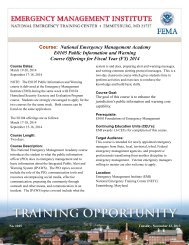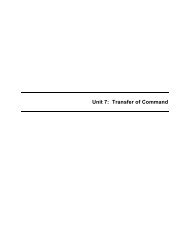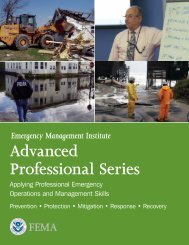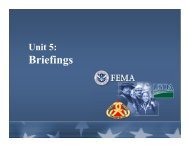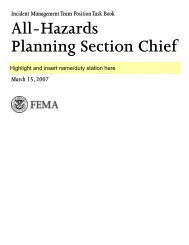enrollment for emi courses - Emergency Management Institute ...
enrollment for emi courses - Emergency Management Institute ...
enrollment for emi courses - Emergency Management Institute ...
You also want an ePaper? Increase the reach of your titles
YUMPU automatically turns print PDFs into web optimized ePapers that Google loves.
EmE r g E n c y ma n a g E m E n t In s t I t u t E • 2010-2011 • ca t a l o g of co u r s E s<br />
<strong>Emergency</strong> response to criminal and<br />
terrorist Incidents (g357)<br />
The primary goals of this course include increasing<br />
safety by describing hazards that may exist at<br />
crime scenes, enhancing evidence preservation and<br />
rescue ef<strong>for</strong>ts, and fostering cooperative working<br />
relationships among all responders through role<br />
and responsibility clarification. The course uses a<br />
combination of instructor-led discussions and video<br />
presentations and concludes with an exercise.<br />
Selection Criteria: The audience <strong>for</strong> this 6 to 8 hour<br />
course consists of persons who will respond to a<br />
criminal or terrorist event. This course is a joint<br />
training ef<strong>for</strong>t that includes firefighters, emergency<br />
medical services, law en<strong>for</strong>cement, public works, and<br />
others with emergency management responsibility<br />
from a local community. It is recommended that<br />
this course be taught to groups from the same<br />
jurisdiction <strong>for</strong> maximum benefit.<br />
Evacuation and re-entry planning<br />
course (g358)<br />
This 12-hour course is designed to provide<br />
participants with the knowledge and skills needed<br />
to design and implement an evacuation and re-entry<br />
plan <strong>for</strong> their jurisdictions. It uses a community’s<br />
vulnerability analysis and evacuation plan. It also<br />
addresses evacuation behavior and recommends<br />
methods to make evacuation and re-entry more<br />
efficient.<br />
This course does not address the decision to evacuate<br />
or re-enter.<br />
Selection Criteria: The persons responsible <strong>for</strong> planning,<br />
implementing, and carrying out evacuations<br />
within a jurisdiction must attend this course as a<br />
team. This includes, but is not limited to, local and<br />
State government emergency program managers,<br />
emergency planners, and response personnel.<br />
93<br />
workshop: partnerships <strong>for</strong> creating<br />
and maintaining spotter groups (g365.3)<br />
This 5-hour workshop emphasizes the valuable<br />
service that spotter groups provide to protect<br />
lives during hazardous weather and flooding. This<br />
activity is intended to promote the creation and<br />
enhancement of spotter groups across the country.<br />
It includes a wide variety of tools and approaches<br />
to help make spotter groups a key part of effective<br />
community warning systems. This workshop should<br />
be delivered jointly by emergency management and<br />
National Weather Service staff.<br />
Selection Criteria: State and local emergency managers<br />
and National Weather Service staff.<br />
mass fatalities Incident response (g386)<br />
This course prepares local and State response<br />
personnel and other responsible agencies and<br />
professionals to handle mass fatalities effectively<br />
and to work with the survivors in an emergency<br />
or disaster.<br />
This course covers incident management, mass<br />
fatalities, planning be<strong>for</strong>e and operations during<br />
an incident, establishing the morgue, family<br />
assistance support operations, and assistance from<br />
the Federal government. The course concludes<br />
with a tabletop exercise.<br />
Selection Criteria: The course is designed <strong>for</strong> a wide<br />
audience, encompassing the range of personnel with<br />
a role to play in mass fatality incidents. Coroners,<br />
medical examiners, funeral directors, heads of first<br />
response agencies (fire, police, EMS, etc.), planners,<br />
and emergency management coordinators will<br />
benefit from this course.<br />
Course Length: 17 hours<br />
FEd E r A L Em E r g E N C y mA N A g E m E N T Ag E N C y<br />
statE/lOcal/trIbal fIElD<br />
cOursEs—prEparEDnEss<br />
& tEcHnOlOgy



